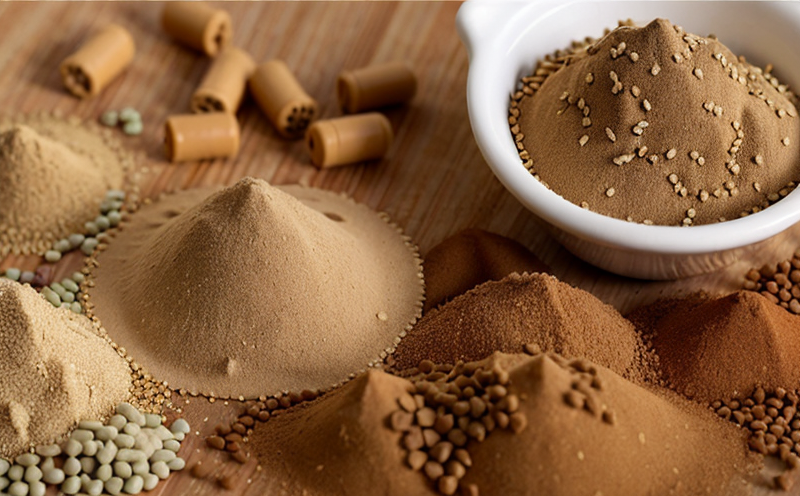Difloxacin Residue Testing in Animal Feed
The presence of veterinary drug residues like Difloxacin in animal feed has significant implications on public health and environmental safety. Difloxacin is a fluoroquinolone antibiotic used to treat various bacterial infections in animals, but its overuse or improper use can lead to drug residues that may enter the food chain, posing risks for human consumption.
Compliance with regulatory standards such as ISO, ASTM, and local guidelines is crucial. The testing of Difloxacin in animal feed ensures that the product adheres to these norms, thereby safeguarding both livestock health and consumer safety.
Our laboratory employs advanced analytical techniques like Liquid Chromatography-Mass Spectrometry (LC-MS/MS) for accurate detection and quantification of Difloxacin residues. This method offers high sensitivity and selectivity necessary for detecting even trace levels of the drug in feed samples.
The testing process involves several critical steps including sample collection, extraction, clean-up, and subsequent analysis using LC-MS/MS instrumentation. The extracted compounds are then ionized in the mass spectrometer, which separates them based on their mass-to-charge ratio. This allows for precise identification and quantification of Difloxacin.
The acceptance criteria for this test are stringent to ensure reliability and accuracy. Samples must be prepared according to established protocols outlined by regulatory bodies. The testing process includes quality control measures such as standard operating procedures (SOPs) and inter-laboratory comparisons to maintain consistent results across different batches of samples.
By adhering to these rigorous standards, our laboratory ensures that Difloxacin residue levels in animal feed remain well within acceptable limits specified by relevant authorities. This not only protects public health but also enhances the reputation of responsible producers and processors in the industry.
Industry Applications
| Industry Sector | Application Details |
|---|---|
| Agriculture | Testing for Difloxacin in feed to ensure compliance with international standards. |
| Poultry Production | Evaluating feed samples for regulatory adherence and safety concerns. |
| Dairy Farming | Monitoring feed quality to prevent contamination risks from veterinary drugs. |
| Cattle Feed Manufacturers | Ensuring feed products meet stringent quality standards before market release. |
The importance of Difloxacin residue testing extends beyond the agricultural sector, touching upon food safety and public health. By providing reliable test results, our laboratory supports industries that rely on safe and wholesome animal products.
Why Choose This Test
Detecting Difloxacin residues in animal feed is essential for maintaining compliance with global regulations. Our testing service ensures precision, reliability, and consistency in results, providing peace of mind to stakeholders involved at every stage of production.
The use of advanced LC-MS/MS technology guarantees accurate identification and quantification of Difloxacin, even in trace amounts. This capability is vital for identifying potential contamination sources early on, allowing for corrective actions before they become significant issues.
Our commitment to quality extends beyond just the technical aspects; we also offer comprehensive support services including consultation on best practices for sample preparation and handling. This holistic approach ensures that our clients have all necessary tools at their disposal to achieve optimal outcomes.
By choosing this testing service, you are investing in a safer food supply chain and contributing to broader sustainability goals within the agricultural sector. Our expertise combined with state-of-the-art facilities makes us the preferred choice for robust residue analysis solutions.
Environmental and Sustainability Contributions
The testing of Difloxacin residues in animal feed plays a crucial role in environmental stewardship as well. By ensuring that only safe levels of veterinary drugs enter the food chain, we help mitigate potential ecological impacts associated with antibiotic resistance.
Avoiding overuse or misuse of antibiotics helps preserve their efficacy for future generations. Moreover, adhering to strict testing protocols contributes positively towards sustainable agricultural practices by promoting responsible use of resources and minimizing waste generation.
Our laboratory’s commitment to environmental responsibility is further exemplified through our adherence to stringent quality assurance measures that minimize the carbon footprint associated with sample transportation and processing.





